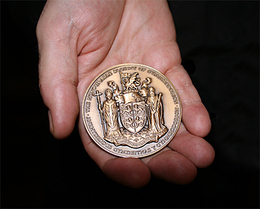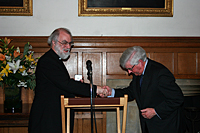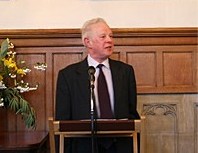Archbishop Awarded Medal from the Honorary Society of Cymmrodorion
 The Cymmrodorion Medal
The Cymmrodorion MedalTuesday 15th April 2008
The Archbishop and his family welcomed guests to the event, held in the Guard Room at Lambeth Palace, including Professor Prys Morgan who presented the Archbishop with the medal.  Professor Prys Morgan introduced the proceedings and welcomed every guest, and ended the event with the presentation of the medal. Dr Prys Morgan is Emeritus Professor of History at the University of Wales, Swansea, Glamorgan and is President of the Society.
Professor Prys Morgan introduced the proceedings and welcomed every guest, and ended the event with the presentation of the medal. Dr Prys Morgan is Emeritus Professor of History at the University of Wales, Swansea, Glamorgan and is President of the Society.
 Lord Justice Thomas, the senior presiding judge in England and Wales, read a citation on the life and works of the Archbishop and his contributions to the Welsh culture.
Lord Justice Thomas, the senior presiding judge in England and Wales, read a citation on the life and works of the Archbishop and his contributions to the Welsh culture.
Medals are not awarded often and the Archbishop expressed his gratitude to the society and to the legacy of churchmen who contributed in the shaping of Welsh culture.
Transcript of the Archbishop's Speech
Yngyntaf, maerhaidimiddweuddiolch o galon am yr anrhydeddannisgwyliadwy yr ydychwedianrheguarnafheddiw. Mae hanes ac etifeddiaeth yr AnrhydeddusGymdeithasyngynefini bob Cymro a Chymraes; 'rwy'nfalchiawnifyndynrhanfacho'rhaneshon, ynolyniaethenwaumorurddasol. Diolchhefydif'annwylgyfaill a chyn-gymydog, Syr John Thomas, am eieiriaucaredig ac anhaeddianol.
Mae mwy nag unhanesiadroddynglyn a pherthynasrhwngCymrua'uheglwys. Heb yr EglwysAnglicanaidd, nicawsomeinBeiblCymraeg, drwylafuriauEsgobion Richard Davies a William Morgan. Ondynaml - ac ynflin - oedd yr EglwysAnglicanaiddhefydynrhwystriurddas a hyder y bobl.Gobeithiafbod yr Eglwysnawrwedisefydlutipynbacheigred-lythyraufelffrindi'rurddascenedlaetholhwn, ac yngymar – aallwnniddweudhydynoedyn 'gymrodor'? – mewntaithtua'rcenedliach ac aeddfed yr ydymnigydyndymunogweld.
The Church and the Welsh nation have not always been comfortable in each other's company. Yet the legacy of churchmen, even Anglican churchmen, in the shaping of Welsh culture, has been immense. Not only Bishops Davies and Morgan, through their work of biblical translation, but also the hen bersoniaidllengar of the early nineteenth century – IeuanGlanGeirionydd, GwallterMechain and so on – who were so largely responsible for creating many of the societies and institutions that carried the torch for Welsh culture in its full historical variety through a period when the pincer movement of oppressive Anglicisation and an increasingly narrow interpretation of Protestantism threatened to shrink the Welsh inheritance. I'd like to think that there have been those in the last century too who have done something of the same – Euros Bowen, R.S. Thomas, Moelwyn Merchant, AneurinTalfan, to name only a few of my personal heroes in this context.
So I should like to accept this honour tonight on behalf of those Welsh Christians and especially Welsh Anglicans who have in this and other ways held to and spoken for that depth and range of national inheritance which a proper awareness of the Christian tradition brings. All too often, in many nations, this tradition is seen as somehow relativising or reducing the authentic voice of a people by introducing a note of moralising or generalising. But when it is doing its job, the Christian voice is something that sets free the imagination of a community rather than stifling it.
When I was first appointed to this post over five years ago, I tried to define my own priorities in terms of recapturing the imagination of the culture. That remains for me near the heart of what Christian witness ought to be; because the gospel provides so extraordinary, so vast a stage for human beings to walk upon, for all their weakness and absurdity. 'Beth ywdyn, itieigofio, a'rteuludynol, itiofaluamdano?' The Christian vision offers the boldest possible answer, in terms of the human destiny for fellowship with the divine – 'cyfoeth o ogoniantsyddargaelyn yr etifeddiaeth y mae'neirhoiichwiymhlith y saint' (Eph. 1.18).
Our contemporary problem is not only a loss of nerve about belief in God; it is a loss of nerve about humanity. It is as if, bizarrely, we welcomed the various reductive accounts of who and what we are that our culture offers us – the various determinisms of economics or genetics or the wiring of the brain. Last week's Times Literary Supplement carried an absorbing article by a distinguished medical scientist objecting to the way in which some literary critics wanted to borrow the jargon of neurology in order to explain the impact of poetry. He argued passionately not only that the correlations some claimed to see were in any case scientifically uninteresting but that the effect of this was to dissolve the particularity of this person's response to these words in this moment. We don't work imaginatively by treating ourselves as abstract beings; we reflect on our relationships, our history, our location, and in absorbing the challenge of the new and creative we bring out of our psyche something fresh, not a standard and predictable response.
It is a fitting key for understanding the place of faith in culture. Faith does not dissolve the particulars of history and language and imaginative creation – which is why the role of Biblical translation in the history of our nation (and others) is a crucial affirmation of the God-given resource of linguistic diversity among human beings, and why figures like the hen bersoniaid concerned themselves with their people and their history. Faith enters into and enlarges the scope and vision of every people's imagination; and without that presence, something radical is missing.
Fel y dywedais am ddechreuad y sylwadauhyn, nidyw'rEglwyswedibodynffrindhollolffyddloni'rgweledigaethhondros y ganrifoeddyngNghymru. Ondmaegennymhanesifodynfalchohono, ergwaethafhynoll. Os bydd y traddodiadCristionogolynfedrusigaelcymeriadmewnbywydcreadigolrhywcenedl, maerhaidi'rEglwysrhoiystyriaethynfwyafofalus a serchogietifeddiaethdiwylliannol y bobl.
If the Church is indeed capable of listening to and encouraging the most creative voices in its ambience, it will find its role; it will be able to speak of that measureless perspective on human destiny which the gospel opens. It will be an irremovable aspect of the fullness of a community's life. In this generous recognition of the Church's role (for I do not deceive myself that this award is made on an individual's merits), I see, with gratitude, an awareness that our nation still longs for that fullness and that perspective to be offered. And I hope and trust that we who represent the community of believers will continue to be faithful to the trust placed in us by our national family.
© Rowan Williams
